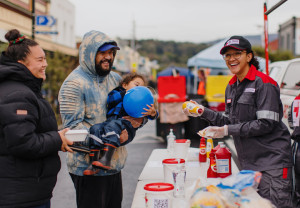Caring | Te manaaki
Transitions can feel threatening to people. Seeking to understand and meet the concerns and needs of those involved will help build enduring support for constructive action.
On this page
Care is defined in many ways. In the dry legalistic sense, we talk about duty of care – that is, acting on behalf of others in a way which prevents harm.
Caring in the context of a just transition means thinking about how transitions and ways of transitioning might impact others or create opportunities to support them. Caring also involves nurturing relationships, guided by compassion, empathy and love. It can be reflected in simple but important acts of hospitality and inclusiveness, like choosing an accessible venue for meetings, sharing kai food and accommodating differences in language, culture or capability. Caring can be extended to all living beings.
Here are some questions to consider:
- How will decisions impact others?
- How can you prevent any possible harms?
- How can you show that you care?
This also resonates with mātauranga knowledge and key concepts of manaakitanga and kaitiakitanga guardianship. In this sense, care is about nurturing and nourishing, mending and tending to people and the planet.
The exercise of care in a community-led transition protects those least resilient to change. When working on your transition plan, identify who might be most impacted and who already faces disadvantages or additional challenges.
Ultimately, care in a just transition is about leaving no one behind, in spite of the challenges of transition. Caring keeps everyone well, so they can help build the transition.
Caring through a community network in South Dunedin (Otago)
 South Dunedin is a diverse community with many older people, people living with learning and physical disabilities, and people struggling on benefits and very low incomes. It is also a community of spirit, humour and proven resilience in hard times. This community faces significant climate change threats and opportunities.
South Dunedin is a diverse community with many older people, people living with learning and physical disabilities, and people struggling on benefits and very low incomes. It is also a community of spirit, humour and proven resilience in hard times. This community faces significant climate change threats and opportunities.
For the South Dunedin Community Network, care means ensuring as many people as possible are involved in the learning and decision-making essential to manage the changes inevitably coming to their landscape.
To do this, the network has instituted twice yearly community hui gatherings, usually attended by more than 100 people, where the decision-makers share what they are doing and listen to community members talk about what is happening at ground level. A shared meal is always part of the hui. These hui make a real difference in the relationship between the city and regional councils and the wider community, resulting in increased trust and respect.
The network’s goal is that the coming changes are done ‘not to us but with us’ so the community experiences care in the most tangible way: by being trusted to be involved in the changes which will affect them most.
South Dunedin Community Network(external link) — southd.org.nz
Photo credit: Dunedin City Council

